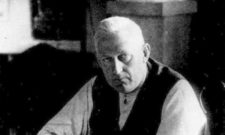Shop our historical maps
Texter
The lesson of Nazism

Jan
Torgny Segerstedt on the lesson of Nazism, published in the column IDAG in GHT on 4 January 1943
At this moment there are not many who think that Nazism has a future. Some persist in pretending to still believe in its survival; they are those who find it difficult to admit blatant mistakes. Those who always go with the flow have followed it even when it has left the National Socialist boat behind on the sandbank where it has run aground. The river flows on and it is only a matter of time before the stranded hull is cut open. Those who have now abandoned the Nazi scow are climbing aboard other ships. They will be proclaimed the only modern ones, even if they have just pitied their backwardness.
Hitlerism has not passed without a trace. It has emphatically inculcated the credulity of the people, their tendency to accept uncritically anything that is proclaimed with sufficient insistence. Nazism may be called a religion, if by this term one wishes to designate ideas which lie on a different plane from that of thought and reason. It has been said that if someone came along and preached that the moon was a green cheese, he would easily create a sect which embraced this statement as an uplifting and saving message. The intellectuals of this community would formulate a dogma, an ideology, which would give the brothers and sisters the clarity of thought they needed. A religious war might well be launched against those who clung to the old, outmoded notion asserted by astronomy. It would be no more remarkable if those who held such scientific notions were subjected to a war of extermination than that the Jews should be so in our day.
When one further examines who it is, for example, in the Nordic countries, who have joined the Nazi doctrine, one finds that it is mainly those who are drawn with inferiority complexes of one kind or another. They have felt withdrawn, as the misjudged geniuses of all times have done. They have tried to compensate for their inferiority by increasing their self-esteem. The latter is a poor surrogate for the recognition they have coveted. So when a chance presents itself for them to play a part, to top those who look down on them, they do not hesitate to seize it. He who samples the quislings in the various countries will find the type everywhere. They want to assert themselves, to float above, and by force keep the others down. They use violence because it is the only means by which they can gain influence. Intellectual and moral authority has been taken from them by nature. To imprison and to kill, requires no moral or intellectual preconditions. It is better without them.
Nazism has also revealed the danger that too strong an organizational being can pose. Why were the German trade unions unable to mount any significant resistance to Nazism? Simply because the people were weaned on personal opinions, personal convictions. They had their opinions with others, they were used to obeying, but not to making decisions themselves. In political matters they behaved only as a mass, felt as a mass. They went along when one of the herd gave the direction. Going along had become their second nature. Independence was dead. The same mentality has not been absent elsewhere. We have enough partisanship in our country. There has been no appreciable difficulty in getting the party press to obey orders. Several party writers boast of their obedience. Their abdication of their own judgment they call loyalty; sometimes they quite boldly turn the matter on its head and call it a sense of responsibility to shirk all responsibility.
Nazism has certainly made many thoughts of the heart manifest. It has brought to light many things which, before its appearance, we thought had been consigned to obscurity. That it had not entirely disappeared was evident from sporadic outbursts. That it would act as a pretender to power was thought impossible. The Western European cultural peoples, however, were taught a lesson. We learned that culture had by no means permeated our societies, that the forces of self-destruction were powerful enough to pose a serious threat to our civilisation.
We learned, therefore, that the power whose creature is human culture is stronger than that whose essence is to tear down.
Subscribe to YouTube:
If you appreciate Allmogens independent work to portray our fine Swedish history and Nordic culture, you are welcome to buy something nice in the shop or support us with a voluntary donation. Thank you in advance!
Support Allmogens via Swish: 123 258 97 29
Support Allmogens by becoming a member
Support Allmogens in your will








